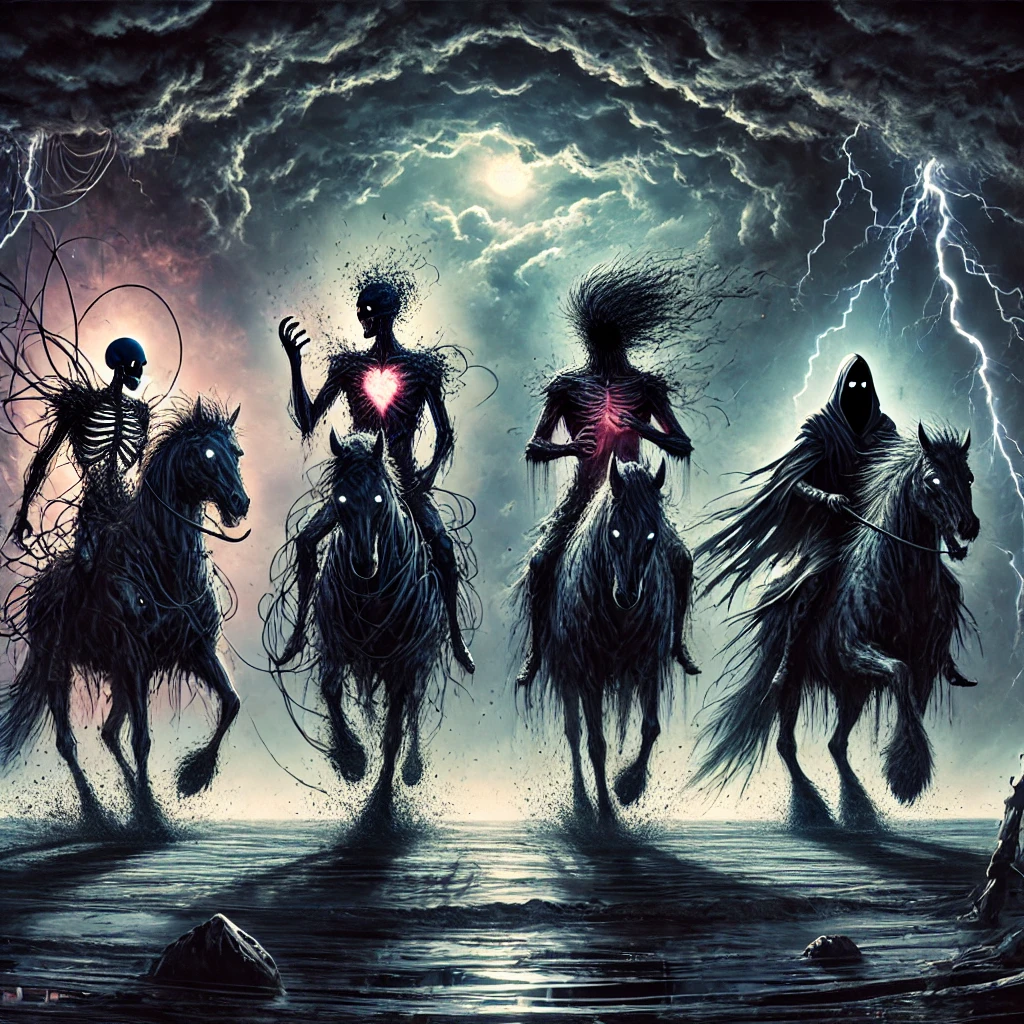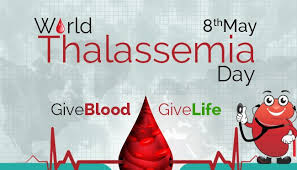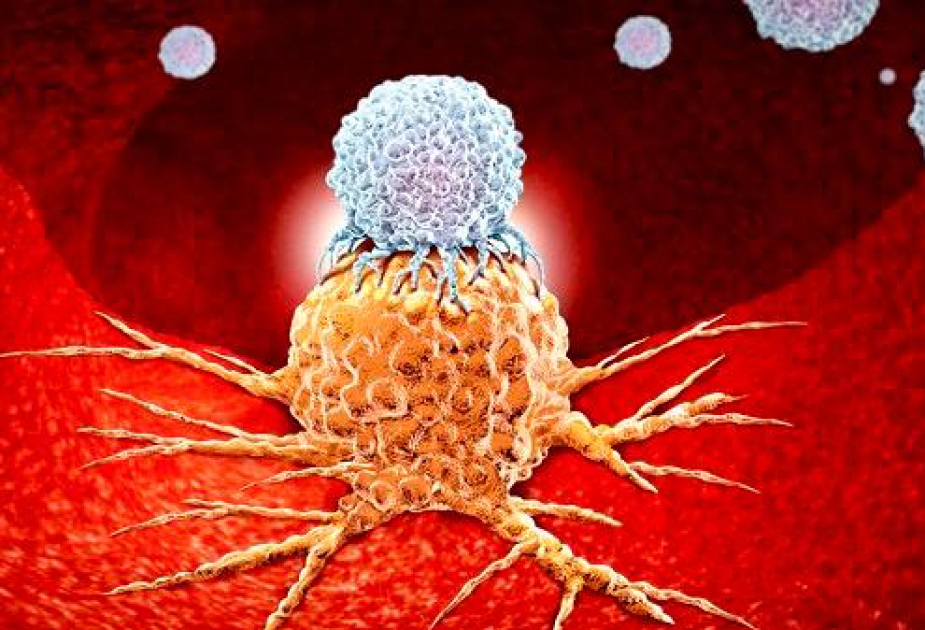Sometimes life brings us to a moment when everything loses its color, and the world compresses into shades of black and gray. Breathing becomes difficult, and the heart feels like a weight within our body. Nothing seems right, the world bends, and you slowly collapse under the weight of uncertainty. This feeling is not just about external problems; sometimes, the biggest culprit behind this dark world is hidden within, inside ourselves. Those four “horsemen” inside us — Stress, Depression, Paranoia, and Panic Attacks — often seize our soul and body with their presence, and we cannot defend ourselves against them.
These “four horsemen” have such a strong impact on a person’s life that they usually drag them into a “hellish” condition. Each of them is filled with harm, inner unrest, and fear. But the interrelated, mutually reinforcing, and complementary effects of these states disrupt the person’s overall mood and daily life. The anxiety that starts from stress, the life sunk into the deep pit of depression, the threatening images of paranoia, and the sudden blows of panic attacks — each is destructive on its own, but together they create a situation that feels like being trapped in the “hell of the human soul.”
Many people try to fight this situation alone. Although each condition has its own unique symptoms and difficulties, these problems actually form a whole — an imaginary “dark spiral.” People often lose their strength in this spiral because their psychological state is not only connected to their inner condition but also influenced by the way the external environment reacts to them. In reality, people should not face this “spiral” alone. One of the crucial factors in understanding and overcoming these problems is deeply understanding them and finding solutions.
In this article, we will analyze in detail how each of stress, depression, paranoia, and panic attacks affects a person’s life and how they transform it into a hellish state. How can these four psychological states trigger and exacerbate each other, complicating a person’s life, and what actions should we take in response to these situations? Let’s explore the answers to these questions.
Stress: The Burdens of Life and the Feeling of Impasse
Life is a continuous cycle of change and constant pressure. While everyone has unique experiences, challenges, and areas of struggle, one common adversary we all face is stress. It influences everything, from our smallest actions to our most complex decisions. At times, stress may feel like just a part of daily life. However, when this pressure persists over time, it can gradually transform life into an inescapable darkness. Let’s focus on how stress alone can complicate one’s life and turn it into a “hell.”
Stress: The Overload of Demands and the Feeling of Being Overwhelmed
In daily life, every problem, challenge, or complex situation can lead to stress. Primary sources of stress include work, family relationships, personal expectations, financial issues, or simply the high demands we place on ourselves. At times, these pressures accumulate to the point where they feel suffocating, as if we’re on the verge of being overwhelmed.
Imagine trying to excel at work, maintain healthy family relationships, stay socially active, remain physically healthy, and, most importantly, find inner peace—all simultaneously. These demands can continuously drain one’s psychological energy. Often, these pressures build up so much that it feels like being trapped in a closed loop: there’s no clear way forward or backward. Everything becomes a mere routine, yet nothing truly brings peace.
This accumulation of stressors can lead to various negative outcomes, including depression, anxiety, and burnout. It’s essential to recognize these signs and seek strategies to manage stress effectively, such as setting realistic goals, seeking social support, and engaging in relaxation techniques.
The Impact of Stress on the Body’s Map
Stress doesn’t just affect mental well-being; it also has significant consequences for physical health. To better understand the pressure and harm that long-term stress causes on the human body, it’s important to first explain how it operates within our systems. Stress triggers the body’s “fight or flight” response, a natural mechanism. When the brain perceives danger, it sends a large energy signal to the body. Hormones, particularly adrenaline and cortisol, rise; heart rate accelerates; muscles tense; and the body becomes physically and mentally more alert.
However, this reaction is only effective in response to immediate “threats.” When the body remains in a prolonged state of stress, it causes a feeling of being “constantly under threat.” As a result, blood pressure increases, the immune system weakens, digestive issues arise, and long-term headaches, migraines, and other illnesses may occur. Symptoms like insomnia, changes in appetite (either increased or decreased), and ongoing fatigue are some of the external signs of stress on the body.
Hidden Life Burdens: The Expectations One Places on Themselves
There is a deeper and more hidden aspect of stress: the pressure that arises from the high demands people place on themselves and the desire to be perfect. Societal expectations, the portrayal of a perfect life on social media, and personal ambitions lead individuals to expect too much from themselves. This can sometimes create a dangerous cycle. Life is not always about success, achievement, good work, and healthy relationships. However, everyone trying to create an ideal life is not always realistic.
Wanting life to be perfect, expecting everything to go right because of that, can place a tremendous burden on a person. It means going against the natural flow of life, because nothing is perfect, and we simply want to be “on top of everything.” As a result, the body and mind cannot withstand this pressure. A person feels so exhausted that they sometimes fail to see things correctly or even understand their meaning.
Psychological Effects of Stress: Feeling of Impasse and Confusion
The psychological effects of stress are often deep and invisible. People frequently attempt to bear this pressure alone, only to realize that life has turned into a massive labyrinth with no way out. The feeling of being stuck, tension, and anxiety are some of the impacts stress has on the brain. A person begins to develop a general negative outlook toward both themselves and the world. Everything seems to be going wrong, everything appears out of control, and these feelings only intensify over time.
As a result, stress not only fills a person’s life with pressure but also makes them feel as if they are crushed under the weight of life. This amplifies feelings of insecurity, low motivation, and despair. One feels trapped in a deep, dark, and oppressive cycle of life, as if nothing can rescue them from this situation.
The Toxic Cycle of Stress: Struggle and Recovery
Stress is not just an emotion – when it becomes a constant part of your life, it gradually damages both your mind and body. However, it is possible to prevent this situation and fight back. Learning how to manage stress, understanding when and how it arises, and developing healthy defense mechanisms against life’s pressures are vital. Different relaxation techniques, meditation, physical activity, social support, and effective time management are essential steps in combating stress. However, the most important step is to listen to your body and live a balanced life to prevent stress.
Stress is not merely a temporary feeling, but sometimes a long-lasting pressure. In such a state, we often forget the beauty and value of life and continue on as a “novice,” weighed down by the burden. The first step in shedding this burden and overcoming the challenges brought on by stress is to acknowledge it and manage every pressure appropriately. This can bring peace and harmony back into our lives.
Depression: The Deep Abyss of the Soul and the Decaying Flower of Life
Depression sometimes feels like “pulling a dark curtain” across one’s life. The sunlight no longer shines through, and the days blur together, lost between black and white. All the values, goals, and expectations of life slowly begin to decay, and eventually, the person loses themselves. Some might explain this situation as “just sadness,” but depression is much deeper and more complex than simple sorrow. It is a condition that affects our bodies, our mindset, and perhaps the most disturbing aspect, how we see the meaning of life. Depression is one of the heaviest and most frightening psychological conditions because it feeds the feelings of hopelessness, emptiness, and worthlessness, deeply weakening the person. Let’s explain in more detail how depression enters one’s life and how life transforms into a “dark abyss.”
The Impact of Depression: The Emptying of Emotions and Hopelessness
When depression enters a person’s life, everything changes slowly but profoundly. First, emotions begin to change. Enthusiasm and interest disappear, and in their place, a feeling of emptiness arises. This feeling starts as a small void but gradually grows, as if the person loses their connection to themselves. Everything becomes meaningless – nothing is as interesting, pleasant, or valuable as it once was.
At first, the person struggles to understand this feeling, but eventually, they accept it. Life becomes just a “responsibility” to get through each day. Even the simplest tasks become monumental challenges. Basic needs like sleeping, eating, and drinking turn into exhausting activities. Sometimes, the person faces the question, “Why should I keep living?” but struggles to find an answer. At this point, the dark side of life intensifies further.
Depression not only empties emotions but also strengthens the feeling of hopelessness towards the future. The person views the future as dark, often unchangeable, or hopelessly unclear. Hopelessness is the central feeling in depression. A person loses hope for the future of their life, thinking that nothing will ever change. This leads to a very negative outlook on the world around them.
Chemical Changes in the Brain: How Depression Affects the Body
In addition to altering mood, the chemical changes depression causes in the brain and body are profound. The reduction in neurotransmitters like serotonin and dopamine in the brain lowers the person’s mood, making them experience feelings of sorrow and energy depletion. Depression can sometimes be understood as a disruption in the brain’s chemical system, mentally and physically pulling a person into a deadlock.
These chemical changes don’t just affect emotions – they also have an impact on the body’s physical health. Insomnia or excessive sleep, changes in appetite – either eating too much or having no desire to eat – emerge. A person feels their physical energy draining, and sometimes just wants to lie down and surrender to life. The pressure of depression permeates every cell of the body. This condition can last for weeks, months, or even years. The person’s energy, will, and enthusiasm run out, leaving them feeling overwhelmed, exhausted, and disconnected from life.
Fighting Depression: Rediscovering Oneself
Depression can sometimes become too overwhelming for many people, and therefore, it should be viewed not just as a psychological condition but also as a physical illness. In fact, the most important step in addressing depression is to see it not as “weakness” or “sadness,” but as a serious medical condition. While individuals may try their best to fight this situation on their own, they often need support and treatment. Depression is not just a decline in emotions; it is also the failure of the body and brain to function properly.
This fight is, of course, not easy. Overcoming depression can be achieved through psychotherapy and medication. However, treating depression involves not only medicine or specialists but also a deep process of self-understanding and acceptance. Strengthening connections with loved ones and support networks is also crucial for those battling depression. A person might feel they are facing this sadness alone, but in reality, the greatest strength and awareness come from the support of others.
“Emerging from the Deep Abyss”: Rediscovering the Meaning of Life
Depression may seem like a stage in life, but overcoming the challenges it brings is extremely difficult. When a person falls deeply into an abyss, they may sometimes feel like there is no way out. However, it is important to remember that even in the deepest moments of depression, this state is temporary. It is possible to rediscover the meaning of life and build that meaning from within.
After people go through this difficult period, they sometimes begin to live life more deeply and purposefully. Depression can, of course, be painful and destructive, but it can also be a turning point for a person to find themselves and rebuild their life. This period can become a stage in which a person better understands the value of themselves and their surroundings, growing stronger and more resilient.
Depression is not just sadness – it is a profound process of rebirth. However, this “rebirth” is only possible through struggle and time. Being patient during this process and being open to seeking help are crucial. In this way, depression does not remain solely the dark side of life; it also allows the person to transform their internal weaknesses into a strong and healthy personality.
Paranoia: Danger and Threats Lurking in Every Corner of Life
Paranoia often starts with very small doubts and can gradually evolve into a fear and anxiety that encompasses a person’s entire life. It is not merely anxiety – it is a condition in which a person transforms their world into a closed, threatened territory. A person experiencing paranoia expects danger at every moment, everywhere. In every corner, in every word, and in every gesture, they see a hidden meaning or intention. Perhaps the most challenging aspect is that these situations never represent clear or real threats – they are only baseless fears and pressures created by the mindset.
Paranoia occurs when a person, even during the times they feel the safest, believes they are in danger, and nothing seems normal. This condition is not only about doubts but also disrupts a person’s connection with their environment and their social relationships, isolating them further. Let’s closely examine how paranoia infiltrates the psyche and how it can turn a person’s life into a battlefield.
Paranoia and Doubts: More Danger than Expectations
Paranoia is, in fact, a form of an expectation disorder. The person constantly analyzes the intentions and actions of others and sees threats in every one of them. This situation damages even the simplest and most natural social interactions. Even the well-intentioned actions of others give rise to suspicion in the person’s mind. Thoughts like, “Why is this person looking at me like that?” or “I’m sure this person wants to harm me” constantly circle in their mind. These thoughts are often wrong and baseless, but the person’s brain accepts these doubts as truths, causing further tension.
The greatest danger of paranoia is when a person begins to search for threats in every action that they perceive as malicious. This can lead to an ordinary conversation, a glance, or even a gesture being interpreted as strange and suspicious. The person distorts the intentions and behaviors of those around them, seeing even a simple smile as hostility. These doubts gradually shake the person’s self-confidence, as everything around them seems to be against them.
Social Isolation: “No Safety, Only Loneliness”
Paranoia not only destroys the inner world but also disrupts social life. The person distances themselves from others and society to gain a sense of safety. If a person constantly suspects the intentions of others, they naturally begin to push them away. In fact, this means not just losing the people around them but also feeling increasingly lonely and uncertain. This is because a person living with paranoia finds it difficult to trust others and believes that the safest approach is not to trust anyone.
Distancing oneself from social interactions, creating isolation, severing connections with people who once had close relationships, and retreating into oneself causes the person to fall deeper into this fearful state. This loneliness actually intensifies the inner confusion and anxiety. The greatest fear the person has regarding the outside world is that they begin to feel even more isolated, as they believe everyone is against them.
Psychological and Physical Effects of Paranoia
Paranoia is not only a mental illness but also has physical effects. Prolonged doubt, fear, and feelings of threat disrupt the body’s natural balance. Adrenaline and cortisol levels rise, heart rate accelerates, causing shortness of breath and tension. This pressure affects various systems of the body, and prolonged fear and stress can lead to illnesses.
Additionally, insomnia is a common symptom of paranoia. A person struggles to sleep due to the fears they have towards themselves, as thoughts constantly occupy their mind. Insomnia, in turn, harms both psychological and physical health. Although everything may start from an internal unease, if this situation persists, it exhausts the person both physically and mentally.
Fighting Paranoia: Rebuilding One’s Sense of Safety
Fighting paranoia is not just about combating doubts – it is a process of learning to trust oneself and believe in oneself. It is about showing self-care and understanding. Psychotherapy and treatment methods are integral parts of this process because people living with paranoia need to understand the sources of their doubts and fears and their distorted thoughts, then compare them to the real world to correct them.
Cognitive Behavioral Therapy (CBT) is one of the most commonly used methods for treating paranoia. This approach helps individuals identify and modify distorted thinking patterns, fostering more secure social interactions. Additionally, establishing social support and building trusting relationships are crucial in providing psychological assistance. Friends and family can play a significant role in helping individuals reconstruct their social networks, develop healthier connections, and reduce feelings of threat.
While danger is a constant in life, paranoia tends to magnify it in a fictitious and unfounded manner. Unlike real threats, the fears generated by paranoia exist solely within one’s mindset. Recognizing and accepting that these fears are baseless can be a pivotal step toward overcoming them.
Combating Paranoia: Cultivating Calm and Precision
Addressing paranoia begins with fostering calm and deliberate thought processes. While everyone experiences fears, it’s crucial to discern whether these fears are based on reality or are dismissible. Understanding the threats and doubts present in daily life, and questioning their authenticity, can lead to significant changes in one’s mental and emotional state. Paranoia, as a condition, can potentially be resolved through renewed trust and affection, though this often requires time and psychological support.
Paranoia poses a substantial barrier to feeling genuinely safe and at ease. However, with the right approach, treatment, and social support, overcoming this condition is achievable.
Panic Attacks: Sudden and Unexpected Waves of Anxiety
Panic attacks are among the most unpredictable and sudden psychological experiences. An intense surge of fear and anxiety can swiftly envelop both the body and mind, sometimes escalating to overwhelming levels. What makes panic attacks particularly alarming is their occurrence without any apparent external trigger, leaving individuals feeling as though they are facing imminent danger, even when no real threat exists.
During a panic attack, individuals may experience rapid heart rate, sweating, trembling, shortness of breath, dizziness, and a sense of impending doom. These episodes can be so intense that they significantly impact daily functioning and may lead individuals to avoid certain situations where they previously occurred.
Understanding Panic Attacks: The Intensity of Sudden Fear
Panic attacks typically commence with a sudden onset of intense fear, accompanied by physical symptoms such as a racing heartbeat, sweating, shaking, shortness of breath, and dizziness. These episodes can peak within minutes and may leave individuals feeling as though they are losing control or facing a life-threatening situation, even when no actual danger is present.
The unpredictability of panic attacks can lead to ongoing anxiety about future episodes, potentially resulting in behavioral changes to avoid perceived triggers. This pattern can significantly affect one’s quality of life, making it essential to seek professional help if panic attacks are frequent or severely impact daily activities.
Physical Manifestations of Panic Attacks: The Body’s Response
One of the most striking aspects of panic attacks is their physical manifestation. The body’s autonomic nervous system responds to perceived threats by initiating a “fight or flight” reaction, leading to increased heart rate, rapid breathing, muscle tension, and other symptoms. During a panic attack, these responses occur abruptly and intensely, often without any clear external cause.
While these physical symptoms can be alarming, it’s important to recognize that they are not life-threatening. Understanding this can help individuals manage their reactions and seek appropriate treatment. Treatment options may include cognitive-behavioral therapy (CBT), which has proven effective in helping individuals understand and control their panic attacks.
Psychological Impacts of Panic Attacks: Navigating the Mental Strain
Beyond the immediate physical symptoms, panic attacks can have significant psychological effects. The experience of sudden, intense fear can lead to persistent worry about future attacks, resulting in behavioral changes such as avoiding certain places or situations where attacks have occurred before. This avoidance can lead to increased isolation and may exacerbate feelings of anxiety and depression.
It’s crucial to understand that panic attacks, while distressing, are manageable. Seeking professional help, building a support network, and employing coping strategies can significantly reduce the frequency and intensity of attacks, leading to a more fulfilling life.
Combating Panic Attacks: Regaining Control
Preventing and managing panic attacks is possible, but it often requires consistent practice and professional support. The first crucial step is to learn from past experiences and accept that these episodes are a part of life. Understanding that such reactions are normal bodily responses can be reassuring. Additionally, practicing deep breathing exercises and relaxation techniques can mitigate the impact of panic attacks. These practices can help individuals experience fewer attacks and respond more effectively when they occur.
Psychotherapy, particularly Cognitive Behavioral Therapy (CBT), is effective in helping individuals alter their thought patterns and reduce the severity and frequency of panic attacks. In some cases, medication may also be beneficial, but it should only be used under medical supervision.
Fighting the ‘Four Horsemen of the Apocalypse’: Rebuilding Life
Stress, depression, paranoia, and panic attacks—collectively referred to as the “Four Horsemen of the Apocalypse”—can profoundly disrupt one’s life. While these conditions share similarities, each uniquely affects an individual’s well-being. They often originate from internal struggles, leading to isolation from both oneself and society. Most importantly, these conditions can lead individuals to feel that their lives are spiraling out of control, plunging them into uncertainty.
Witnessing someone trapped in anxiety, worry, and fear, losing control over their life, is challenging. However, it’s essential to recognize that there is a way out of this “hell.” Each condition requires its own treatment and understanding, but overcoming them is not just an individual endeavor; it’s a societal concern as well. In many cases, these mental health challenges cannot be overcome alone. Professional assistance, psychotherapy, and medication are crucial. Moreover, the support and empathy from society play vital roles in providing the strength and motivation needed for recovery.
These conditions are part of human experience, and even in the most severe situations, recovery is possible. The first step is for individuals to recognize and accept their condition. Only then can they look forward to the future with hope. Stress, depression, paranoia, and panic attacks are not just transient; they can be long-term challenges. However, with healthy coping strategies and proper approaches, individuals can overcome these challenges and rebuild their lives.
Life is often unpredictable and complex, but every person has the capacity to discover their strengths, protect themselves, and rise again. Each difficulty presents an opportunity for self-discovery and growth. Fighting stress, depression, paranoia, and panic attacks begins with regaining self-confidence and learning to prevent recurring traumas and fears.
On a broader scale, social support and empathy are powerful tools in this battle. People may find it difficult to accept help, but the presence of an understanding and supportive community can have a profoundly positive impact. Empathy and visible support play irreplaceable roles in helping individuals dealing with these conditions feel stronger and safer. A person finds their way not only by believing in their own identity and inner strength but also by showing empathy towards others.
Fighting these four “Horsemen of the Apocalypse” also lays the foundation for a healthy and stable future. Engaging in this struggle is not just about winning the present battle but also about securing future well-being. Stress, depression, paranoia, and panic attacks, though they may shake a person, can also reveal their strengths and create opportunities for a better life. These challenges are steps towards self-understanding and empowerment.
Most importantly, even in moments when life feels like hell, it’s crucial to remember that individuals possess the power to rise again and restore their lives. This belief drives each person to continue their struggle, overcome challenges, and create opportunities for new beginnings. Life is not solely filled with hardships; it’s also rich with struggles and victories. Each of these “Horsemen” offers a lesson, teaching us how to find our path and combat them. Victory and renewal are always possible.
Author: Shahlar Ruhi
Translate to English: Madina Mammadova









